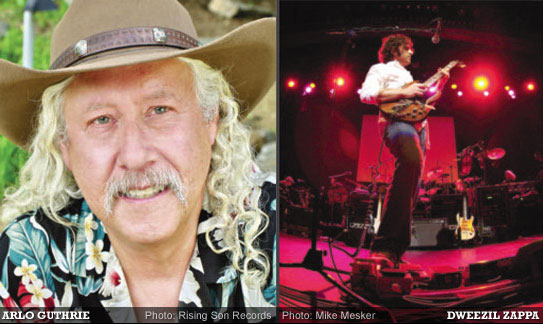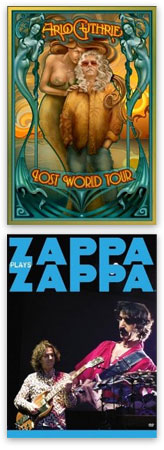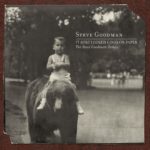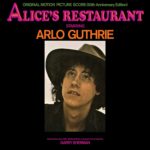
ARLO GUTHRIE
Arlo dropped out of college after only six weeks, just in time for Thanksgiving dinner. After eating at a restaurant housed in a deconsecrated church owned by friends Alice and Ray Brock, Arlo and a friend offered to dispose of the Brocks’ garbage, found the landfi ll closed, and decided to throw the trash down a hillside. They were arrested for littering. The incident kept him out of Vietnam and inspired “Alice’s Restaurant Massacree,” the song that launched his career, landed him on the main stage at the Newport Folk Festival in 1967 and created the basis for his highly successful debut album later that year.
Arlo went on to release many other albums, dipping into folk, country, blues and rock, along the way performing at Woodstock, writing a children’s book and founding his own record label, Rising Son Records. In recent years, Arlo has toured extensively with his own son, Abe, represented on the 2007 live album In Times Like This.
Arlo describes his most recent release, Thirty-two Cents Postage Due, as “not a normal record for us,” an effort which remained unreleased for over ten years as a result of technical problems.
“My dad had been turned into a postage stamp that was worth 32 cents, so we thought on the occasion of him being a stamp, we would go back and record some of the songs that had made him popular to begin with.” New Woody Guthrie songs were coming to light as Wilco, Janis Ian and Eliza Gilkyson put music to his lyrics. “We recorded Thirtytwo Cents in Branson and brought the ADATs back, and nothing was in sync. Finally the technology changed enough over the last ten years so we could put the stuff back the way it was recorded. Abe added chatter between the songs, to make it a sittin’-around, pickin’ kind of record, not something we’d never done before, sort of live-in-the-studio.” (See review in On the Record.)
Arlo also currently devotes his energies to philanthropy, founding the Guthrie Center and the Guthrie Foundation, which address issues as diverse as the environment, education and Huntington’s disease, which took his father’s life. These charities are now housed in the same church in Massachusetts where Arlo once ate a very fortuitous Thanksgiving dinner.
DWEEZIL ZAPPA
Born September 5, 1969, and originally named Ian Donald Calvin Euclid Zappa after his father’s bandmates (the hospital wouldn’t allow an unusual name like Dweezil—how times change), Dweezil Zappa is the second child of composer Frank Zappa. In the 1980s, he did a stint as an MTV VJ, had a few movie roles and put out his first album, Havin’ a Bad Day, at age 16, followed two years later by My Guitar Wants to Kill Your Mama. His third album, Confessions, was released in 1991. Dweezil released two albums with his brother Ahmet under the band name Z, and did not release another solo album until 2000’s Automatic.
In recent years, Dweezil’s focus has shifted. Feeling that his father’s music was unconscionably falling through the cracks, he leapt into action and the result was Zappa Plays Zappa. Dweezil listened to every album Frank ever made in chronological order (over 60 recordings) and had to all but re-learn to play guitar in order to master the complex parts Frank wrote. Dweezil enlisted toprate band members, including Aaron Arntz, Scheila Gonzalez, Pete Griffin, Billy Hulting, Jamie Kime and Joe Travers, along with guests like Steve Vai, Napoleon Murphy Brock, Terry Bozzio and, currently, Ray White.
The first Zappa Plays Zappa tour, dubbed the “Tour de Frank,” took off in 2006, which also saw the release of Dweezil’s most recent solo album, Go With What You Know. The group enjoyed great success and has been performing ever since. Last summer, they appeared on festival stages, including Bonnaroo and Rothbury, as well as playing a number of individual concerts. Last year they released a concert CD/DVD, recorded in Seattle in 2007.
![]()
Elmore: What are you listening to right now?
Arlo Guthrie: A pretty wide range of stuff. I’m listening to some baroque music, some Bach in particular, Big Bill Bronzy, Sonny Terry and Brownie McGee, some Leadbelly. I’m reading you the list from my iTunes player.
Dweezil Zappa: Basically I’m only listening to Frank’s music these days because of what we’re working on all the time. The most recent thing was a new record that’s coming out of his called One Shot Deal which has some pretty cool material that we’re learning for the tour.
EM: What was the first record you ever bought?
AG: The Best of the Everly Brothers.
DZ: The first record I remember buying was Van Halen. I bought a cassette, in 1981 or ’82.

EM: Where do you buy your music?
AG: I probably download almost everything. I haven’t been in a music store in years.
DZ: I haven’t purchased an album in a very long time but if I research something or would think to buy it, obviously I would have to go to where everybody else goes—online, some digital outlet like iTunes or something else but I haven’t been into a record store to buy a record in eight or nine years.
 EM: What was the first instrument you played?
EM: What was the first instrument you played?
AG: Guitar or harmonica. I got a guitar when I was five years old, for my birthday, and I still have it. A little Gibson threequarter-size guitar. My dad told the story that on my birthday, he told my mom he was going to get me a guitar, she said, “That’s great,” and the neighbor overheard him, and said, “Would you get one for my kid, too.” They both figured that my father would pick up some plastic instrument for five bucks—it was tough times and they were always broke—and my dad came back with two 70-dollar guitars, and the shit hit the fan. My mom was yelling, “How could you get a fiveyear-old kid…” even today, a 70-dollar something is not something a five-yearold would generally get. My dad said, “If you get the kid a toy, he’ll play it for two weeks and that will be the end of it, and if you get him a real instrument, he’ll play it for the rest of his life.” About ten years ago Gibson wanted to remake my dad’s guitar, which had a sign on it that said, “This machine kills fascists.” In the process, they found out about this little one, and they issued a father-and son two-for-one kind of deal, started remaking that model, and it became a signature model for them. When Gibson called about that guitar, I checked in with the neighbor’s kids, and she still had her guitar, and now her grandkids are playing it. That guitar is still in production, it’s been very successful for Gibson.
DZ: I got a Fender Musicmaster guitar when I was about six or seven and I just kind of would hit the strings and make some noise with it but I didn’t really focus on playing it until I was 12. I also noodled a little bit on the drums but I never really fully understood what was going on with that instrument. I got heavily into guitar after I bought that Van Halen record.
EM: What brought you to the instrument you now play?
AG: We have these old movies, there are no sound to ’em, but the only thing you ever see is me with a guitar and harmonica. That’s all I did for the first 13 years of my life. I don’t remember when I picked up the harmonica—I’m sure I was stealing my dad’s.
DZ: I always liked Frank’s playing, but growing up, it just seemed impossible to do what he did. Then I heard Van Halen and Led Zeppelin and AC/DC and something in that said, “Oh well that’s probably possible, so let me do that.” So that’s just one part of the influence that makes my playing what it is now, especially since most of the things that I have to do on guitar with Zappa Plays Zappa are impossible.
EM: Who would you like to write with that you haven’t?
AG: I don’t write with other people, and I should. I’m never around other people enough to do that. We’ve been on the road for the last 15 years. It’d be fun to write with people whose work I admire. Randy Newman, for example. I can’t imagine writing a song with Randy, but theoretically, that would be fabulous. Same thing is true with JD Souther or James Taylor, or anyone of my ilk, whose work has withstood the test of time. Their work is iconic. It would be fun to see what the difference would be, writing with some of those guys. Writing with Dylan might be fun, but I kind of doubt it.
DZ: I haven’t had a chance to really think about it. I got some plans with some guitar players that we’ve been chucking around. A guy named T.J. Helmerich and Brett Garsed so that would be a fun project. I like Wayne Krantz, I like what he’s doing, he might sit in with us at a show on the East Coast but I haven’t had a chance to really even think about writing anything. That’s going to be a strange thing when I actually block out time for me to make my own music again.
EM: What musician influenced you most?
AG: That’s a tough one. Musically, aside from the old stuff I grew up with, the Everly Brothers kind of stuff, the music I found most interesting was certainly the Beatles. And lyrically, there’s nobody like Dylan, especially the early stuff, whose imagery influenced us all, really. There’s a lot of stuff in between there.
DZ: I would say my dad really. From the beginning I was really inspired by him. I had periods where I listened to a lot of other people’s music but I always still listened to his music as well, and now pretty much the only thing I listen to is Frank’s music.
M: What made you realize you wanted to be in music?
AG: I didn’t want to be in it professionally. I wanted to be a forest ranger because I never wanted to be around large crowds of people. My mother was a modern dance teacher, and she said I should study dance. Her guitar player, Earl Robinson, was classically trained and gave lessons on the side. I became a musician, first of all, because I didn’t want to dance, and of course the great reason that any guy becomes a guitar player is to meet chicks. I grew up thinking, “Oh, this is kinda fun!” and it wasn’t more true then than it is today. All I needed to make was pizza money. At 18 I wrote “Alice’s Restaurant,” and everything changed overnight. I grudgingly went along with the fame and fortune that accompanied it.

DZ: One of the things that got me most interested in guitar was actually “Eruption,” from the first Van Halen record. There’s something about the aggressive sound on that recording that just really appealed to me. I was listening to lot of guitar players at that stage—Randy Rhoads, Angus Young, Jimmy Page—all these different players focused on the guitar gymnastics element. Frank’s music is much harder because he doesn’t play like a guitarist, he plays like a composer playing against all of the elements. There’s so many idiosyncrasies in his playing, the tones he uses; his own technique is bizarre anyway, and his phrasing. That is a much bigger influence on me than it was before, because now I have the tools to start playing in that certain idiom.
EM: Who would you like in your rock and roll heaven band?
AG: It depends on whether it’s a professional Heavenly Band, or whether we were just hanging out on the steps of the Pearly Gates. I would love to play with Leadbelly—he was so far ahead of his time, and doesn’t get much credit for it. Beethoven on keyboards. On B3, you’d have to go to Bach, you’re not going to find a better organ player… on vocals, Billie Holiday, that would be sweet. Doug Dillard is still one of the finest banjo players alive. I love playing all different kinds of stuff, I don’t get to do that as a performer; I don’t even get to do that as a recording artist. But I can pretty well sit in with anybody and not screw it up too awful.
I have always included blues in the show—it’s not stuff we’ve recorded. But lately, my voice has finally gotten old enough to make some of the old blues sound real. There’s nothing more odd than seeing a 16-yearold kid play the blues. You have to live long enough and get your voice grouchy enough to work some of this stuff, to give it the emotional impact it deserves. You have to have enough life experience. Finally, I’m getting old enough to where I can actually pull it off! Now, when I get together with my kids, the most fun I’m having is when I’m singing bass.
DZ: I’ve always liked John Bonham’s drumming, so it’d be fun to play with him. I’d like to see Jimi Hendrix play with John Bonham and you might as well have John Paul Jones playing bass, because he played great with Bonham. I’ve never gravitated towards keyboard players too much, but George Duke was my favorite keyboard player in Frank’s band, so I’d throw him in there, and Ray White on vocals.
EM: What’s your desert island CD?
AG: Let’s hope it’s a tropical island, then I would bring a record of Hawaiian tunes. If I were going to be on a Saudi Arabian island, I would bring some Middle Eastern tunes. In my vision, it’s a tropical island, it ought to have some Hawaiian music playing.
DZ: I would say that it would probably have to be Apostrophe (‘), I think it’s right up there.







[…] the story of “Alice’s Restaurant,” and the story remains that it’s without a doubt Arlo Guthrie’s most beloved song; his fans just can’t get enough of the nearly twenty minute epic. Arlo has said […]
[…] Price: I went and heard Frank Zappa’s son, Dweezil, at the Beacon Theater. Impressive. I hadn’t heard anything I was impressed with for a long […]
[…] hard to believe that it’s been ten years since Dweezil Zappa last released a solo album. But in the years between 2006’s Go With What You Know and […]